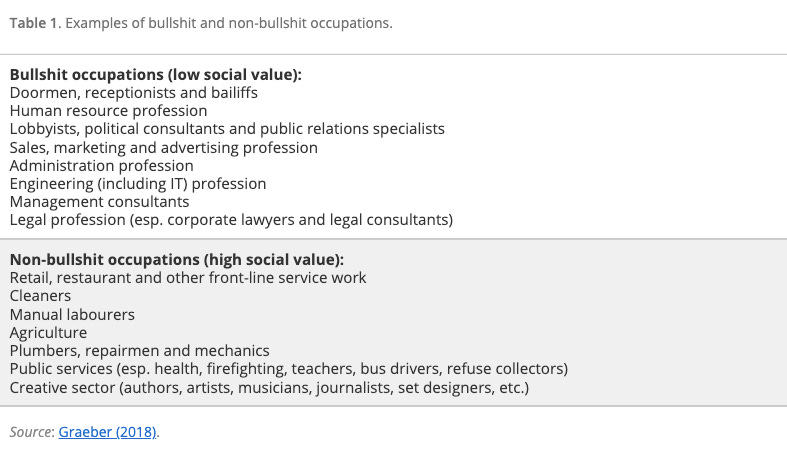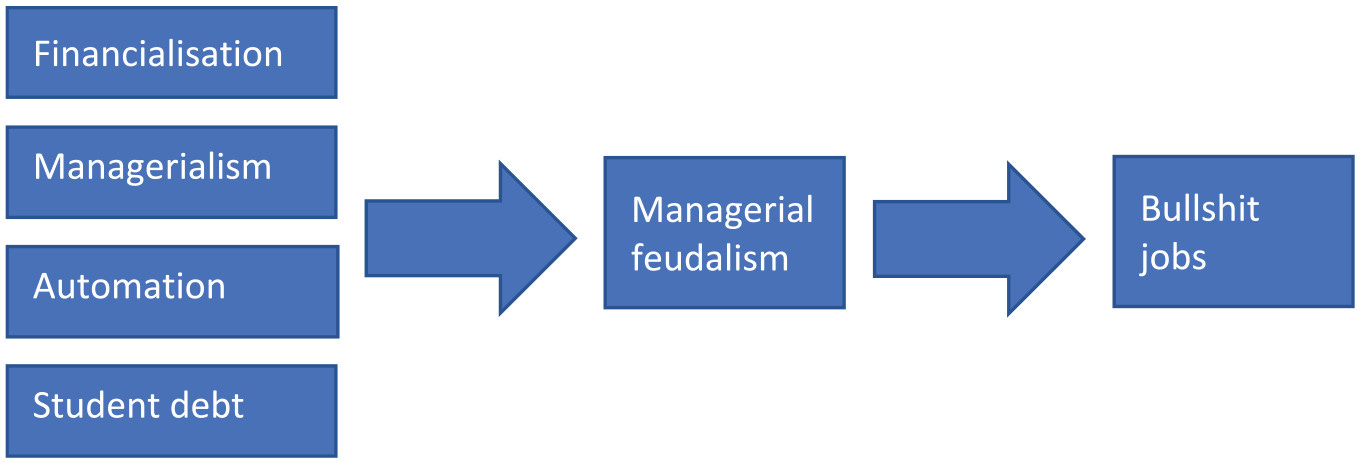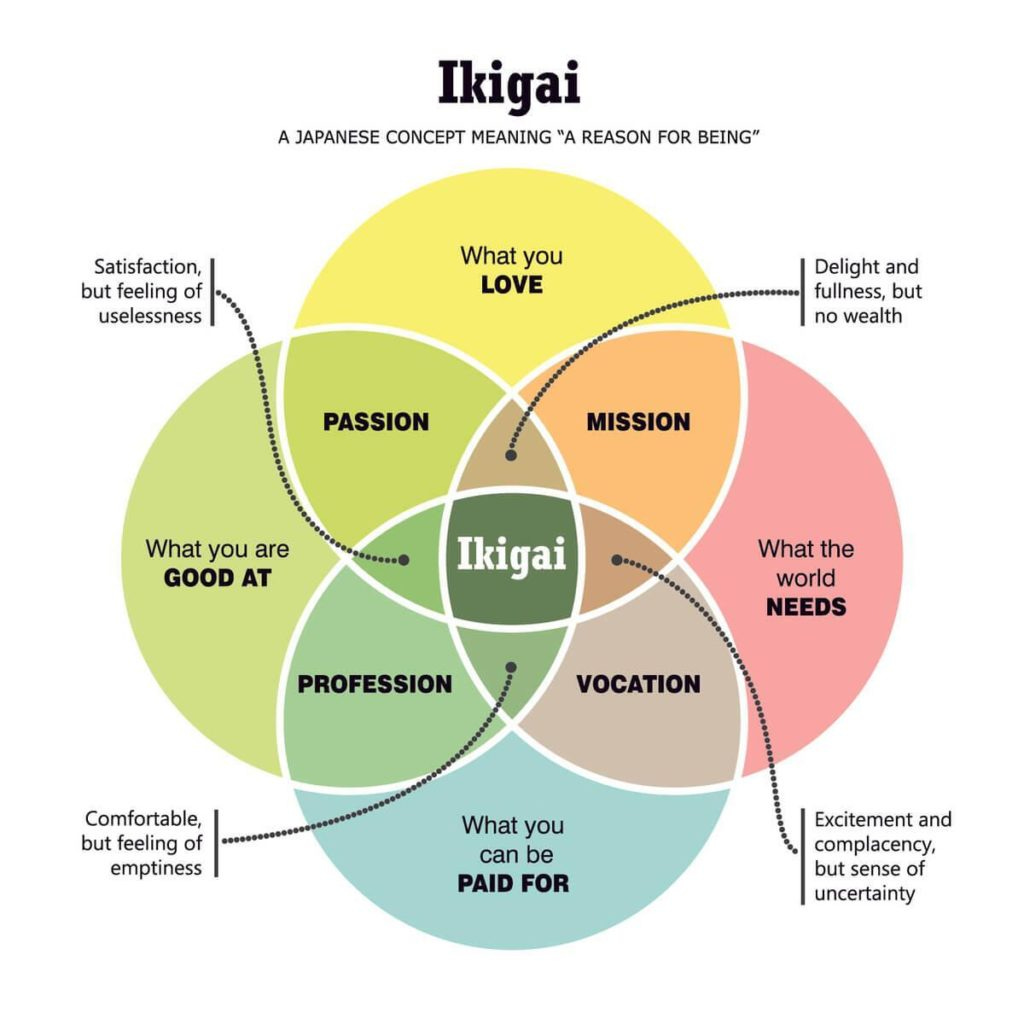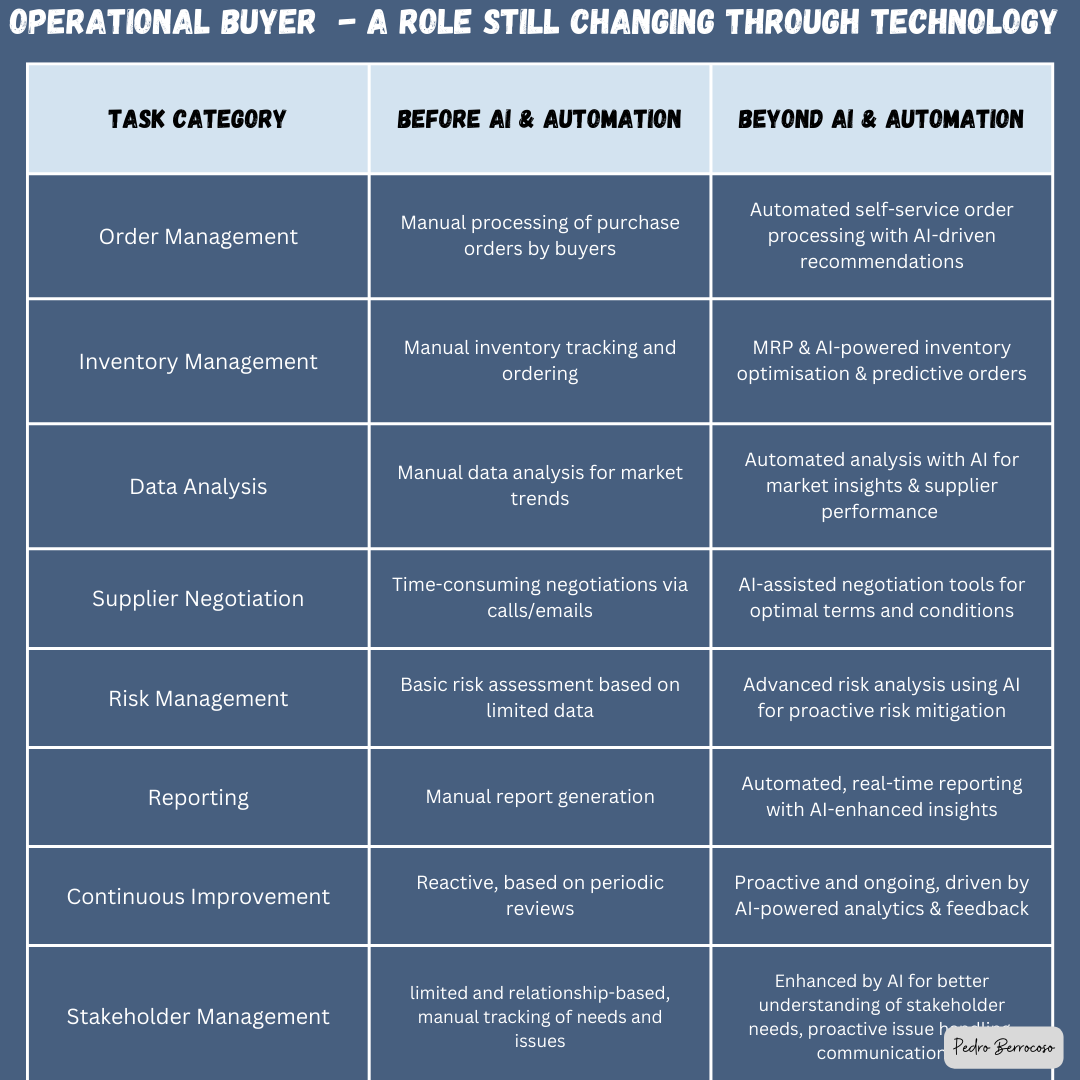Beyond 'Bullshit Jobs': How Automation is Reshaping Our Work
Do “Bullshit” jobs really exist?
Do jobs exist that offer no societal value and are entirely pointless?
And even if such jobs exists, do people in these jobs find any satisfaction out of them or is financial compensation enough for the dullness and zero impact they create?
The term Bullshit jobs (B/S from now on onwards), has sparked considerable debate over the last few years. Often, the rise in these unfulfilling jobs is attributed to AI & Automation, fragmenting end to end manual activities into disconnected parts devoid of feelings of ownership, control over own tasks and ultimately lacking a sufficiently meaningful satisfaction for employees.
Upon reading about Graeber’s theories for the first time, I found myself wondering if there could be an intersection between his views and my own perceptions of the benefits of technology.
This post aims to take a deeper look into the complexities of job satisfaction and purpose arguing that AI & Automation are the enablers of better work rather than the source of B/S jobs.
The Phenomenon of B/S jobs
In his book “Bullshit Jobs: A Theory” from 2018, late David Graeber an anthropologist and social theorist argued that B/S jobs in the workplace are rising and that they are representing a significant portion of people’s work in contemporary economies.
David Graeber defined B/S jobs as:
“a form of paid employment that is so completely pointless, unnecessary, or pernicious that even the employee cannot justify its existence even though, as part of the conditions of employment, the employee feels obliged to pretend that this is not the case”
His proposition includes a view that:
20 - 50% of all employees are doing useless jobs
there has been a rapid increase in parts due to bureaucracy
A high proportion of B/S jobs can be found in administrative roles with limited impact on end-products or services compared to farmers, cleaners, refuse collectors with a clearer link to customers (see graph)
young post-graduates are more likely to be holding a B/S job due to student debts
that useless jobs are impacting mental health, societal values & cause spiritual violence
they are a consequence of managerial feudalism, a layering of hierarchies to stop those at the bottom to stand-up
According to surveys conducted in 2015, 37-40% of employees declared that stopping their work activities would not create any impact at all.
There is actually no real purpose behind the work executed.
Graeber’s theory is complemented by attributing social value “the significance of a jobs contribution to society" as a measure for usefulness of jobs.
Following Graeber, anyone performing knowledge work in Finance, Procurement, IT and Consulting have roles determined as “B/S occupations” with insufficient societal value to justify existence and citing here:
in secret everyone knows that they are absolutely unnecessary!
He characterised B/S jobs into 5 main types existing to justify other jobs or for image reasons:
Graeber understood that however boring or monotonous a job was, people would still be satisfied in doing these tasks if they could create impact and support a cause they were aligned to:
It’s not that people want to work; it’s that people want to feel they are transforming the world in a way that makes a positive difference - D. Graeber
Something which was difficult to achieve with B/S jobs.
Find here an interview with David Graeber outlining why there is a need for a revolution at work lead by the “Caring Class”.
As a radical stream of thought, which caused a stir and perhaps influenced discussions about what “purpose at work” really entails, there is a lack of a nuanced view to sufficiently acknowledge the benefits of Automation to transform roles to become more purposeful and satisfying.
The role of AI & Automation at work
Graeber perceives this trend as reinforcing the dominance of upper management, consequently leading to inflated organisational structures.
He labels this phenomenon managerial feudalism, a cycle characterised by escalating bureaucracy and a reduced focus on productive tasks due to an excessive focus on management roles.
This perspective partially aligns with the Automation Paradox i wrote about a couple of months ago here and which describes how paradoxically, automation leads not to fewer jobs but to an increased workload in managing and overseeing automated processes.
Access my recent Linkedin Post on the Automation Paradox if you want to read more about it by clicking HERE.
Managerial feudalism may be a critical reflection on recent work structures and the inclination of management to serve their own interests but lacks a balanced view to acknowledge the role of Automation and AI in contemporary work concepts.
His perspectives starkly contrast with the prevailing view on the impact of Process Excellence, Automation, and AI.
In the modern narrative, these technological advancements are not seen as a source of job redundancy, but as enablers of more efficient and fulfilling work.
This contemporary outlook underlines the fact that technology is not creating a burden but paves the way for improved work processes and efficiencies.
The evolution of the workplace is rapidly adapting to a digital-savvy and purpose-driven workforce with a strong interest for autonomy and resistance to rigid organisational structures.
Jobs have to be redefined with this in mind:
Integration of technology in everyday work: The new workforce has a high affinity to quickly learn and use AI and automation tools in their daily tasks, streamlining processes and increasing efficiency.
Removing monotonous, menial tasks from workers which often are dehumanising, boring and often demoralising and supporting the creation of better work life balance which is a top concern for younger talents
Creating additional capacity for workers to spend more time on higher value tasks and innovation and with that perform deeper analysis, tackle improvement projects and build skills & capabilities in support of their growth ambitions
Giving more room to increase employee experience through personalised services & insights and an improved process performance with digitalised end-to-end process chains supporting comprehensive visibility of work and its contribution to a common purpose
Enhanced Data Analysis and decision-making: AI provides deep insights and data-driven decision-making capabilities, enabling workers to engage in more informed and impactful work.
Customisation of roles: AI and automation allow for greater customisation of job roles to suit individual strengths and interests, aligning with the aspiration of future generations
Opportunities to contribute: and have a direct impact through acquired Citizen Development skills and AI projects and realisation of their full potential.
In my view, the future work is not going to be measured by busyness and the traditional metrics of productivity and profitability only but by the level of fulfilment of employees in their roles and their levels of satisfaction.
And this is were AI & Automation will support a digitally-savvy workforce to overcome the burdens of B/S jobs and reconfigure job roles to bring back “purpose at work” as a central aspect of professional life.
The intricate journey to find Purpose
So why does purpose at work actually matter?
Whilst this blog post is centred around the theory of B/S jobs and the impact of AI & Automation, finding purpose and meaning in what you do at work is a central concept to retain talents and offer contemporary work.
Purpose, fundamentally, is an individual's 'why'—it's the driving force that gives meaning to our actions and desires.
The journey to uncover one's life purpose varies; for some, it comes naturally, while others may find it through a process of introspection, experimentation, and external feedback. This journey can lead to a deeper understanding of what motivates us and the specific mission, values, and contributions that bring satisfaction in both life and work.
For example, i view my own purpose to include “my aim to inspire others to improve and excel” amongst other things. This intersects with parts of what i like to do at work through my advisory and coaching work.
Shedding light on my purpose wasn’t a an immediate conclusion but a journey through roles and experiences to unveil what motivates me and truly resonates with my core values which now i seek to synchronise closer with work.
This journey, in spirit, echoes the Japanese concept of Ikigai, which emphasises the importance of aligning one's reason for living with professional life.
For more on the topic of purpose and Ikigai take a look at the recommended bestseller linked here: Ikigai - the Japanese secret to a long and happy life written by Spanish authors, Héctor García & Francesc Miralles.
In closing thoughts, the integration of AI & Automation in the workplace can help with this alignment, by freeing-up employees from mundane tasks and enabling them to engage in work that resonates with their deeper purpose
What chance does AI & Automation offer for the Future of Work
Returning to the core topic of this post, let's explore more in detail how AI & Automation can bridge the gap between personal fulfilment and professional success.
These technologies are not just reshaping how we work, they are redefining work itself.
As it is an oversimplification to view jobs as fulfilling transactional needs, to expect that every role has to align with each individual's purpose is to idealistic. Technology in the form of Automation and AI offers here an opportunity to realign and redefine roles, making them more meaningful.
Confucius once said:
“Choose a job you love, and you will never have to work a day in your life “
This quote attributed to Confucius carries a lot of wisdom, but may not explain fully the complexities involved in aligning one's career with passion in today’s world.
Every job has its challenges and even passionate work requires hard work.
There are roles which are simply needed because they are crucial for organisational success and contribute to the bigger picture :
Management is a required activity in any organisation and carries value
Operational efficiency is fundamental to business success although in the form of back-office jobs distanced from key customers and products
Every role, regardless of its nature, contributes to the larger picture. Even jobs that might seem less aligned with personal passions or societal values play a part in the success of the organisation.
There is value in stability and reliability. Not all roles are about innovation and creativity. Some are valued for their consistency and reliability, providing a stable foundation.
Differing competencies may fit different roles . A job which may seem unfulfilling to some may be very satisfying for others or just simply suffice to compensate a healthy lifestyle.
In a contemporary work settings the quote by Confucius could be adapted to reflect the role of technology and its importance for more satisfying work:
”Choose a job where Automation removes the barriers to seeking alignment with your purpose”
Reflecting on Graeber's theory, I reflected on my own experiences in the procurement field, particularly in my very first role as an operational buyer before continuing my studies and moving into Consulting & Technology roles.
The role of an operational buyer has remained relatively unchanged overall and over the course of the last decades has mostly seen incremental adaptations through a swap of technology and bits of new tools here and there.
The challenges in this role often still lie in an overburdening volume of transactional activities and lack of time for more strategic tasks, better planning, improvements, proactive stakeholder and supplier management. These limitations often block the view to the role’s fundamental purpose to effectively support the company’s procurement needs for serving top quality products at the right price and cost for their customers.
When I was in this role, it was difficult to find satisfaction in processing purchase orders and tackling escalations until the Automation of some of the activities gave me more time to proactively organise myself and the work i was doing and spend more time in conversations with suppliers and the shop floor.
However, with AI & Automation making inroads into procurement, the role is still progressively changing and will continue to accelerate across different roles over time.
This evolution in my early career role is reflective of a broader shift in the workplace, where AI & Automation are enabling not just efficiency but also a deeper alignment with personal values and purposes.
From my personal experience in different roles technology is not a burden but an opportunity for a reconfiguration of jobs to create better alignment with “purpose at work”.
In conclusion
Reflecting on this, I am convinced that the future of work, amplified by AI and Automation, holds more promise than ever for aligning our careers with our personal values and purposes
Contrary to the notion of B/S jobs, I see AI and Automation as accelerators for a true redefinition of work. These technologies are key to flattening organisational structures, providing tools to align work more closely with individual purpose than ever before.
A quote from Satya Nadella that truly resonates with me says:
“The real power of technology is not its ability to replace humans, but its ability to amplify our human potential”
Having this perspective in mind is going to be crucial to continuously humanise work with the dual interests of companies and employees.
I encourage you to take a moment to consider your current role:
❓Does it align with your personal values and purpose
❓How might technology enhance your job satisfaction
❓What role do you see AI & Automation playing to remove true B/S activities
Feel free to share your thoughts and insights in the comments or connect with me on social media to continue this conversation about shaping a future where work is not just a duty but a fulfilment of our potential.
Here the link to the post on LinkedIN supporting this article in case you would like to join the discussion there.
Connect with me via my LinkedIN profile to follow my posts on Digital Transformation, Process Automation and other cool topics around Digital Procurement i frequently share.
Thanks for reading Process Automation Pulse! Subscribe for free to receive new posts and to support my work.










